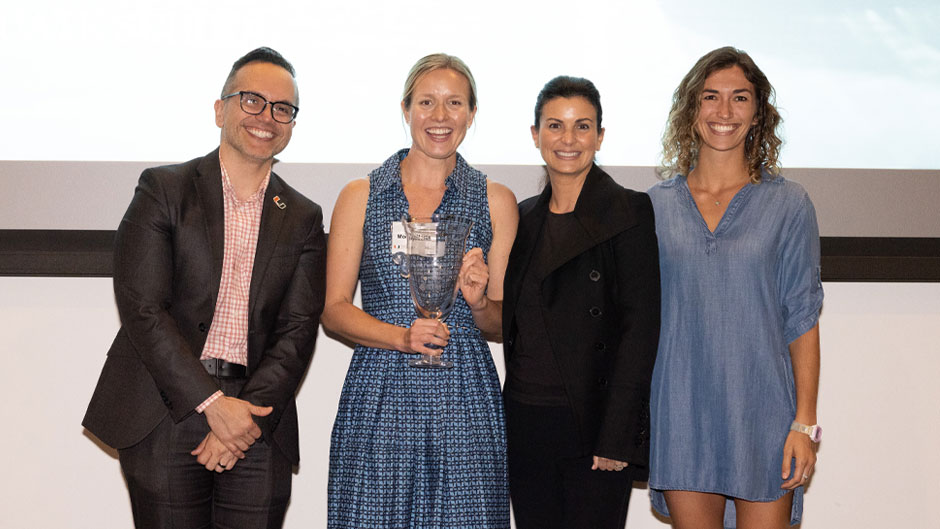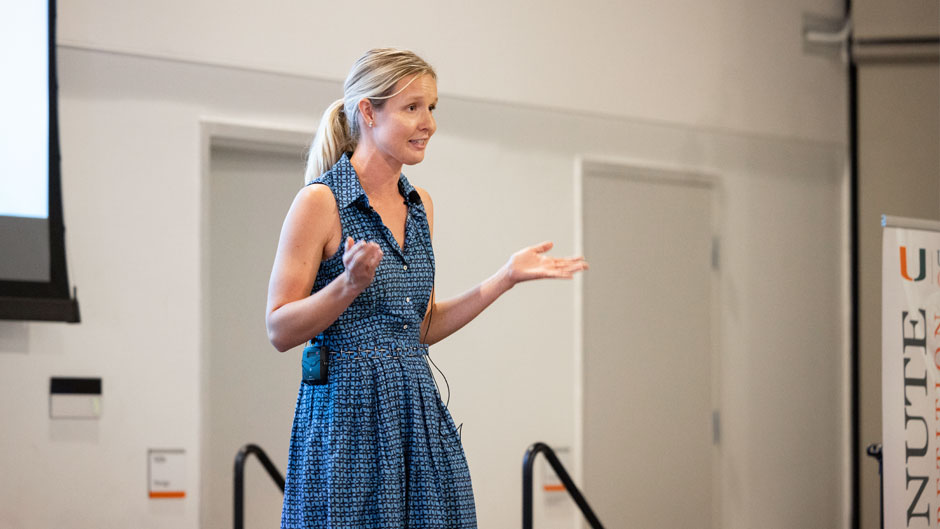Today, if an ophthalmologist suspects a patient may have ocular cancer, they must take a biopsy from the eye, which is painful and can sometimes lead to infection.
Acadia Moeyersoms, a Ph.D. student in cancer biology at the University of Miami Miller School of Medicine, wanted to create a less intrusive solution. She worked with her advisor, research professor Daniel Pelaez of the Bascom Palmer Eye Institute, to design a test where doctors and nurses could simply wet a small piece of paper with the person’s tears to determine if they have ocular cancer.
“My project focuses on developing less invasive diagnostic tests using the molecular information in your tears,” she said. “Tests like these are extremely important for communities such as South Florida where UV exposure significantly increases the risk of developing eye surface cancers.”
For her ingenuity, and her ability to explain this innovation easily, Moeyersoms won the Graduate School’s seventh annual Three Minute Thesis competition last week, earning a $750 cash prize, along with a trophy for the Miller School of Medicine. She was shocked to win.
“Everyone did so well, and this was such an amazing competition—I am honored to win,” she said. “It’s a unique opportunity to explain your research this way and to also get to learn about other research going on at the University.”
Moeyersoms was just one of nine accomplished graduate students who summarized their dissertation research in a flash during the competition on Thursday evening at the Lakeside Village Expo Center. The students were judged by Devang Desai, president of the University of Miami Alumni Association; Jeffrey Duerk, the University’s executive vice president for academic affairs and provost; Kathi Kern, vice provost of educational innovation; and Nichole Crenshaw, associate provost for diversity, equity, and inclusion and associate dean for undergraduate nursing programs at the School of Nursing and Health Studies.

Leaders from the Graduate School praised the students for being courageous enough to join the competition.
“The importance of being able to distill and clearly convey complex ideas into a nutshell just gets more important every year, as the amount of information we all encounter increases in scope, speed, and volume,” said Patricia Abril, associate dean of the Graduate School, who helped coach the students before the event. “If everyone could do that, it would be amazing, and this is what they are doing here today.”
Guillermo “Willy” Prado, dean of the Graduate School, also commended the students: “You all are already winners in all of our eyes,” he professed.
Moeyersoms, who also took home the People’s Choice Award and an additional $350, explained her research alongside nursing sciences doctoral student Kathryn Gerber, who observed a traumatic brain injury firsthand when her brother fell off a sled one winter near their Minnesota home and suffered a concussion. Although he recovered, as Gerber grew up and played sports, she observed more traumatic brain injuries (TBI) and decided she wanted to help these patients by becoming a nurse. Gerber said that she hopes her research on TBI will help doctors and nurses understand the importance of treating the most severe injuries in a timely way.
Another competitor, mechanical engineer Jordan Wright, is exploring the use of 3D printing to create stronger, lightweight composite materials like those used to create aircrafts—but in a more efficient way. And Riley Blocker, a physics doctoral student focused on ocean optics, created a submersible version of a unique camera called a polarimeter. It can compare underwater polarization pictures with satellite images taken from space to help illustrate the ocean’s constituents, possibly including the location and scale of harmful algal blooms occurring across the globe.
Blocker said participating in the competition has helped him learn how to recap his work quickly so he can chat about it with anyone.
“Getting a chance to explain my dissertation concisely is a powerful way to get my ideas across to strangers and participating in 3MT is valuable because more people can be reached if you communicate information in a way that’s digestible and easy to learn,” he said.
The aforementioned were joined by other graduate students from a range of different subject areas, like Kelsey Johnson-Sapp, the competition’s second place winner. As a doctoral student in marine biology at the Rosenstiel School of Marine, Atmospheric, and Earth Science, Johnson-Sapp is unraveling how some corals—often those closer to cities—continue to thrive, despite warming ocean temperatures.
Miller School biochemistry and molecular biology student Chloe Kirk is analyzing a mechanism called amyloid bodies to better understand cancer at the cellular level. Frost School of Music student Bailey Grogan is researching six prominent female jazz instrumentalists to break down stereotypes that the genre is dominated by men. Katlyn Aviles, from the School of Communication, is studying how the media’s depiction of witches mirrors and influences society’s views of environmentalism. Yini Wang, from the Miami Herbert Business School, is exploring the complex history and repercussion of the U.S. financial market watchdog’s ability to audit Chinese companies.

